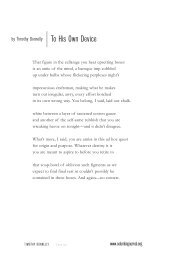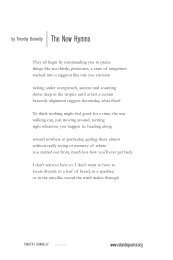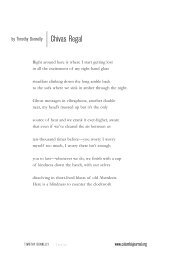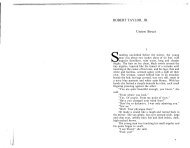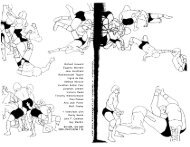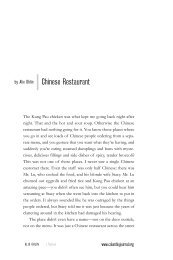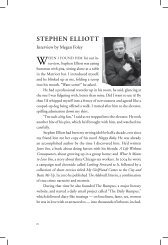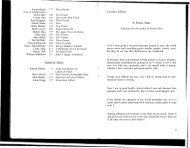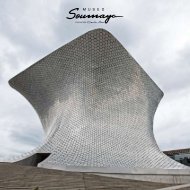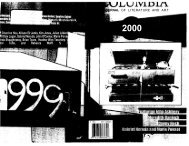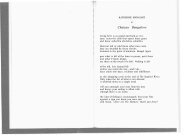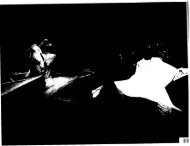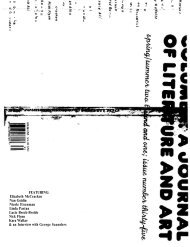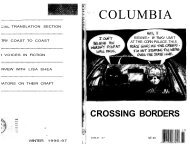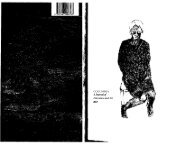Issue 42 - Columbia: A Journal of Literature and Art
Issue 42 - Columbia: A Journal of Literature and Art
Issue 42 - Columbia: A Journal of Literature and Art
You also want an ePaper? Increase the reach of your titles
YUMPU automatically turns print PDFs into web optimized ePapers that Google loves.
(the only living son <strong>of</strong> the 12 children his wife would give birth to)<br />
<strong>and</strong> was confronted by his father-in-Iaw's blue eyes gazing up at<br />
him. Manusz tried to beat his father-in-Iaw's ghost out <strong>of</strong> his son,<br />
but it refused to budge. Instead it stared out at Manusz from his<br />
young son's face, mocking, judging, making him wild with aggravation<br />
so that finally Oskar was not allowed to look at his father. His<br />
mother had hoped that her father's troublesome ghost wouldn't be<br />
able to follow them on the difficult, confusing trip to America, but it<br />
was worse in New York between her son <strong>and</strong> husb<strong>and</strong> than it had<br />
ever been between her husb<strong>and</strong> <strong>and</strong> father in Hungary.<br />
His mother had hoped Oskar would be a rabbi, which Manusz<br />
thought was a great joke. Every afternoon before he went out,<br />
Manusz Tiklowicz beat his son <strong>and</strong> then locked him in their apartment<br />
with its nailed-shut windows. Study hard, you wretch, he'd<br />
shout, you monkey, as he walked down the hall.<br />
By the time he was 14, Tiklowicz had taught himself to read<br />
English poetry; with money he earned carting coal for a mikvah on<br />
Ludlow Street, he bought leather-bound books <strong>of</strong> Shelley, Keats <strong>and</strong><br />
Byron. He spent restless nights in the tiny tenement apartment listening<br />
to his coughing, snoring, muttering, whimpering sisters<br />
sleep while he mulled over a line <strong>of</strong> verse; Beauty is truth, truth<br />
beauty, - that is all Ye know on earth, <strong>and</strong> all ye need to know. How<br />
easy in the early dawn to pull the nail out <strong>of</strong> the window frame<br />
<strong>and</strong> climb up the fire escape <strong>and</strong> greet a startled Alberto sipping<br />
watery hot milk.<br />
There was no question in Oskar's mind that God didn't exist; he<br />
could no sooner have been the rabbi his mother wanted than a<br />
warlock. He started a coal-carting business with Alberto, <strong>and</strong> the<br />
two <strong>of</strong> them dragged the heavy sacks up <strong>and</strong> down narrow tenement<br />
staircases <strong>and</strong> fire escapes from dawn until nightfall.<br />
And then, when he cut <strong>of</strong>f his peyess, his father broke his nose.<br />
He overheard a friend <strong>of</strong> his father's talking about the fur business<br />
in Canada. Oskar decided to go <strong>and</strong> take Alberto with him.<br />
"It'll be like back in Mauritania," Oskar teased his solemn friend.<br />
"When you rode with Berbers across the Atlas mountains. And, you<br />
know, those Berbers are Jews. Like a lost tribe."<br />
But Alberto followed Oskar to Canada the way he had followed<br />
him through the New York ghetto his entire adolescence without<br />
a second thought like the Sephardic brides weighted down with<br />
silver, their palms tattooed in henna curlicues, their fingertips blood-red,<br />
<strong>and</strong> cheeks decorated with black kohl triangles, that he had watched<br />
trail after their grooms along the cobbled streets <strong>of</strong> the Fez mella.<br />
Alberto was Oskar's shadow: a quiet, motherless, fatherless child,<br />
preoccupied with the memories that had followed him from Morocco,<br />
the visions that crawled into his eyes when he slept or breathed in<br />
the smell <strong>of</strong> horse dung in the hot sun or listened to the clang ting<br />
clang <strong>of</strong> the blacksmith's hammer on Delancey Street. But Oskar was<br />
a star in the blacked-out sky, allowing light, possibility into the world<br />
for Alberto. Oskar conjured money, supplies; wrote to his mother's<br />
cousin who had a seed-exporting business in Montreal. Then he flew<br />
north to Canada like an eagle, with Alberto under his wing.<br />
The two <strong>of</strong> them camped <strong>and</strong> travelled through Upper Ontario the<br />
summer <strong>of</strong> 1907; they hired a dour Ojibwa man to canoe them from<br />
lake to bog to lake, along freezing, rushing rivers, past beaver dams<br />
<strong>and</strong> Indian settlements, under swarms <strong>of</strong> geese, clouds <strong>of</strong> mosquitoes,<br />
<strong>and</strong> black flies. They were Champlain <strong>and</strong> Frontenac, Oskar declared,<br />
pushing along in birch canoes, the wealth <strong>of</strong> the forests unfolding<br />
before them. They bought beaver pelts from Huron <strong>and</strong> Ojibwa Indians<br />
<strong>and</strong> baskets from a Cree woman with a swollen, goitered neck for<br />
Alberto's little sister, Mila. Oskar heard about a nickel mine near Dorset<br />
<strong>and</strong> they went to visit. Tiklowicz had an uncanny gift for business: it<br />
frightened Alberto a little (his own mother's superstitions with her<br />
H<strong>and</strong> <strong>of</strong> Fathma <strong>and</strong> magic necklaces <strong>of</strong> colored glass still lurked inside<br />
him.) He had always known that Oskar had Sight. He could overhear a<br />
sentence, a detail, <strong>and</strong> know if something would work, if a trapper was<br />
lying, what would make money, what they should do. Oskar gave<br />
their business a name, too, on the third night they camped out: The<br />
Upper Canada Holding Company.<br />
The night they spent on the shores <strong>of</strong> Lake Erskine was cool. Alberto<br />
waded into the water <strong>and</strong> caught three rainbow trout. Oskar fried them<br />
in lard with thick slices <strong>of</strong> yellow onion, black pepper <strong>and</strong> potatoes. He<br />
made c<strong>of</strong>fee <strong>and</strong> they drank it sweet with condensed milk <strong>and</strong> had a<br />
fishy-tasting cake <strong>of</strong> frying-pan bread. Oskar had borrowed money<br />
from his mother's cousin in Montreal <strong>and</strong> he had invested it now,<br />
almost all <strong>of</strong> it, for the Upper Canada Holding Company. They<br />
owned that night, the two <strong>of</strong> them, a quarter interest in the Dorset<br />
nickel mine they had visited, fifty shares in the Baptiste-Kearney cadmium<br />
mine, a tiny stake in a timber company out <strong>of</strong> Dwight, <strong>and</strong> 70<br />
beaver pelts. Almost everything was leveraged against each other, a<br />
house <strong>of</strong> cards waiting to be pushed over. But Oskar didn't Inind. He<br />
understood what he had invested in.



